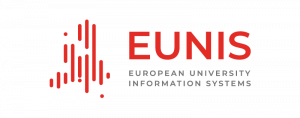About the EUNIS Dørup Award
The EUNIS Dørup Award is given for the outstanding and innovative application of information technology (IT) in an educational setting. It was founded in commemoration of former member of the EUNIS Board of Directors, Jens Dørup.
The award was handed out for the first time at EUNIS 2008. This first award session and ceremony took place at the University of Aarhus: very appropriately the workplace of the late Jens Dørup for more than 25 years.
Judging Criteria
The award contest is organised by the EUNIS Learning and Teaching Special Interest Group in collaboration with the current award chairperson and the President of EUNIS.
The award is given for an innovative way of using existing or new information technologies to enhance learning. The project must combine innovation, pedagogy and technology as key factors for creating more effective and engaging learning. Evidence to show the benefits will be essential.
| Judging Criteria | Explanation |
|---|---|
| Pedagogy/Business goals | The project must clearly demonstrate the involvement of a pedagogical idea or educational objectives. The pedagogical foundation must be presented and show the IT-enhanced learning activities are aligned with or connected to other learning activities. |
| Innovation/Imagination | An implementation of the project must have taken place and the ways in which it is innovative and different should be described. Imagination can include creative solutions to common problems or long term vision. |
| Benefits | The project must show evidence of demonstrable benefits to the target community. Types of evidence to show benefits achieved might include: case studies; institutional performance indicators; internal and external evaluations; student feedback and focus groups; system logs or other statistics and anecdotal evidence from both students and staff. |
| Transferability | The submission should consider the extent to which the project can be easily repeated, and deliver benefits, in other institutional contexts. |
| Collaboration | The submission should outline how collaborative working has benefited the project; this can be between students and staff, between different departments, inter-institutional. |
| Technology | The technology/ies used can be proprietary, open source, cloud or self-developed, but the choice of technology must be explained and show how this technology gives added value in this context. |
The judges will find it helpful if you structure your abstract and paper so that the judging criteria are clearly addressed. Your abstract should use the criteria as headings.
We are particularly interested in the use of technology to support active engagement of learners. If your paper concerns a learning object or learning platform you should specify the types of activities developed around this.
We are interested in the innovative use of technology. You may enter a paper about a well-established technology so long as you are using it in an innovative way.
Rules for submission
The submitter’s organisation must be a member of EUNIS. The submitter or a member of the team involved must be able to participate in the annual EUNIS Congress. You should only resubmit a project that has been entered in previous years if there have been significant developments since your last paper.
Current members of the EUNIS board cannot apply for the Dørup Award. An individual can only win the Dørup Award once but teams and collaborations can win any time.
Submission procedure
A full paper submission for EUNIS Congress (within the call for papers) is requested. Details of the Award deadlines are published on the web pages for each year’s annual congress.
Award
The winner(s) will receive a certificate and a framed print of a painting by Danish artist Maj Dørup (daughter of Jens Dørup) as well as being invited to present their work at the Congress.
Award Winners
2023: EUNIS Dørup Award went to Juan Antonio Martínez-Carrascal and Joaquim Campuzano Puntí from Universitat Autònoma de Barcelona, Spain for the paper Designing Learning Spaces in the Digital Era: new approaches for new ways of learning and to Felix Ziemann, Duy Nguyen, Franziska Blum, Ulrike Lucke from University of Potsdam and G.A.S.T. , Germany, for the paper Personalized Recommendations for Individual Learning Pathways: supporting Ukrainian refugee students in continuing university education.
2022: no award
2021: no award
2020: ‘Designing Digital Higher Education: Case Aalto Online Learning’ by Tomi Kauppinen, Yulia Guseva and Sara Gottschalk from Aalto University Foundation, Finland.
2019: “A case study in learning spaces for physical-virtual two-campus interaction” by Robin Støckert, Alexander Refsum Jensenius, Anna Xambó Sedó, Øivind Brandtsegg from the Norwegian University of Science and Technology, University of Oslo, Norway
2018: no award
2017: Instituto Universitário de Lisboa, Portugal, Introducing the Learning Scorecard: a tool to improve the student learning experience, by Elsa Cardoso, Daniela Costa and Diogo Santos
2016: No award given
2015: Warsaw School of Computer Science, Poland, Networked Virtual School – beyond OER and MOOC, by Andrzej Żyławski
2014: University of Zagreb, Croatia and Mälardalen University, Sweden, Technology in Real-Life Teaching of Distributed Software Development , [presentation]
2013: University of Porto, Portugal, Learning spaces and students’ entrepreneurship: the strategy for the successful implementation of an e-learning café in campus U. Porto
2012: No award given.
2011: University of Zagreb, Croatia, Strategies for the Implementation of Web 2.0 Tools in academic education
2010: No award given.
2009: University of Southampton, UK, Enhancing Learning Using Synchronised Multimedia Annotation
2008: University of Zagreb, Croatia, E-tivities With a Wiki: Innovative Teaching of English as a Foreign Language
